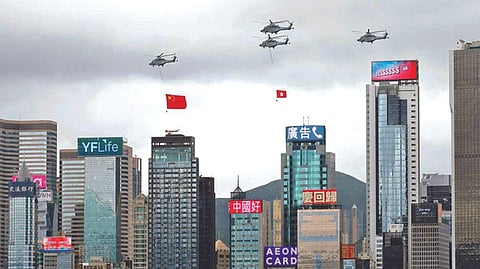

When Gloria Chan left Hong Kong for the UK in early 2022, the city had just witnessed a series of forced closures of independent media outlets and arrests of media owners and journalists under the National Security Law (NSL). She was one of tens of thousands of Hong Kongers who went into exile in countries such as Canada, Australia and the UK.
Chan and several friends formed Green Bean Media, which produces many documentaries, to report on the developments in Hong Kong and in the diaspora community.
“Even though a number of our friends have been arrested and a number of media organizations were shut down, it doesn’t mean there is no news in Hong Kong,” she told DW. “That’s why we think it’s important to keep documenting. We want to rebuild a platform for people to share their views because we believe deliberation can help Hong Kong grow in the way that it should.”
Over the past year, several Hong Kong journalists abroad have founded similar media outlets, which share the goal of ensuring access to uncensored information. “We want to provide information to both the audience in Hong Kong as well as the diaspora community across the world,” Jane Poon, a journalist with decades of experience who co-founded the online media outlet The Points, which covers a wide range of news, including developments in the Hong Kong Legislative Council, told DW. “We just want to provide an environment like the one we used to have in Hong Kong,” she added.
“If you want to know what’s happening in Hong Kong nowadays, the strongest bet is to look at the exile media,” Steve Vines, a British journalist who spent more than 30 years in Hong Kong and is now director of the Association of Overseas Hong Kong Media Professionals, told DW. “More and more organizations are putting together newscasts and sharing information that is perhaps inaccessible in Hong Kong.” Overseas media outlets face multiple challenges. They have limited resources and personnel. “All of our staff work on a part-time or freelance basis, and that also means we still need full-time jobs on the side to sustain ourselves,” Chan said. “It is not easy to juggle all the responsibilities and find time for everyone to work together. Every day is trial and error for us, and we need to accept that we can’t work perfectly.”
Vines said overseas media outlets were also restricted by the fact that they have less access to Hong Kong and because it is difficult to assess the risk to sources on the ground. “Everyone is aware of the limitation, and they are also nervous about compromising the safety of contributors in Hong Kong or China,” he said, adding that overseas outlets also faced constant accusations of being “one-sided.”
The large-scale clampdown on journalists since the NSL was introduced has created a chilling effect in the city, with prominent figures, including Jimmy Lai, who founded the pro-democracy newspaper Apple Daily, and top editors of the pro-democracy media outlet Stand News, appearing in trials.
In 2022, Hong Kong dropped to No. 148 on the Reporters Without Borders World Press Freedom Index. Poon from The Points said overseas media outlets did not necessarily need to worry about being directly affected by the NSL, but that people might hesitate to subscribe because they could become targets. Thus, the outlets also often lack funds. “The NSL is a quite powerful measure to limit our sustainability, and, on top of that, as many Hong Kong people have moved to new countries recently, they need to save money for their everyday life,” she said.
Visit news.dtnext.in to explore our interactive epaper!
Download the DT Next app for more exciting features!
Click here for iOS
Click here for Android